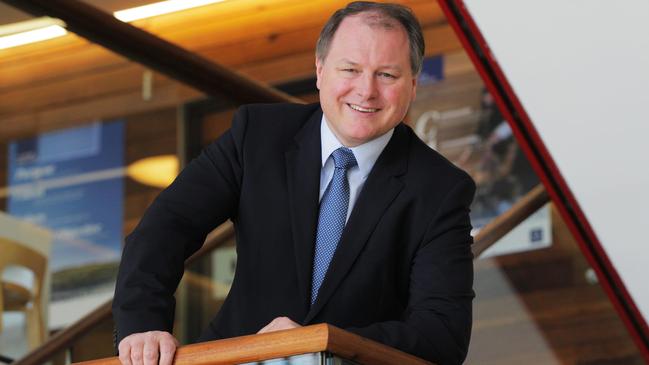Stockland chief executive Mark Steinert says housing shortage may emerge in every state
The property developer expects residential prices will rise by 5-7 per cent in Sydney and Melbourne over the next 12 months.

The country’s largest listed residential developer Stockland has warned that housing shortages could emerge in every market in Australia as the property cycle accelerates, as investors backed its strategy to pick up the best opportunities as smaller developers struggle to access finance.
In a bullish display at the company’s annual meeting chairman Tom Pockett said the share price had risen by a third since last year as investors embraced its strategy, although all residential companies benefited from the Morrison government’s re-election.
Stockland is also seeing the lift in sentiment flow through to its estates and had healthy first quarter sales, prompting investors to drive up the stock by about 6.5 per cent to $4.92 on Monday.
“The housing cycle has clearly bottomed and we expect prices and volume growth in the land business and established markets,” Stockland chief executive Mark Steinert said.
“Over the next 12 months we think prices will be rise by 5-7 per cent in Sydney and Melbourne and by 5 per cent or more in Brisbane and Perth,” he added.
But he warned that bank restrictions on much of the industry would drive a “continued reduction” in new housing starts.
“We can see the banks generally are not in a position to lend to mid-size and small developers and that’s creating a lot of opportunities for Stockland to potentially co-invest and buy sites that have opportunistic high returns well above our cost of capital,” Mr Steinert said.
But the Stockland boss warned that due to the inertia in the market and inelastic nature of housing supply it could take about 18 months for many developers to re-engage and start projects.
“We expect you will see quite a considerable undersupply emerge in just about every housing market in the country,” he said.
Stockland had a solid start to the financial year, with its residential estates turning in their strongest quarter of calendar 2019.
But the company still expects profits to be skewed to the second half as it is still blighted by defaults.
The company’s residential business had its strongest quarterly result this calendar year, finishing moderately above expectations with 1149 net deposits taken and 4,245 contracts on hand.
But about 65 per cent of profit will come in the second half this year.
“The residential market cycle has improved, particularly in Sydney and Melbourne, and the southeast Queensland market is steadily improving. We remain on track to deliver over 5000 settlements in fiscal 2020, including around 500 town homes,” Mr Steinert said.
The company said that revenue in the next financial year was expected to benefit from the residential recovery and five new estates opening.
“The Sydney market was particularly strong in September, however our overall default rate remains elevated due to a portion of contracts extended from the fourth quarter of fiscal 2019 not settling, and the settlement volume for the quarter being seasonally lower,” Mr Steinert said, noting the issue was washing through.
“The number of defaults is moderating and the default rate is expected to reduce over the balance of the financial year,” he said.
“Around 80 per cent of our residential customers are owner-occupiers, and the current low interest rate environment, improving credit conditions and government incentives are driving buyer confidence,” he said.
Stockland this quarter launched a new town home project, The Parks at Red Hill in Canberra, and also kicked off building on its Altona North town home project in Melbourne.
The company said its retirement living business was performing “in line with expectations” but flagged it had been unable to sell a stake in it, saying “a transaction in this sector is likely to take considerable time to complete”.
Stockland’s retail town centre portfolio also had a sales lift reflecting remixing to growth categories and less new retail space being built and the portfolio is shifting towards non-discretionary and low-discretionary spend.
In major office news, the company reached a heads of agreement with its long-term tenant Optus to renew its lease at Macquarie Park in Sydney.
On the logistics front, it bought two assets from the Fife group in Brisbane’s prime industrial zone, at Carole Park and Richlands with an end development value of about $140m, and has also struck a large deal in western Sydney.
Stockland reaffirmed its flat outlook for the year, dubbing market conditions “mixed”, with steady employment growth, record low interest rates, recent tax cuts and high investment in infrastructure partly offset by constrained credit availability, weak consumer sentiment and global trade conditions.
“Distributions per security will also be flat, and our distribution payout will be at the bottom end of our 75-85 per cent target ratio,” Mr Steinert said.




To join the conversation, please log in. Don't have an account? Register
Join the conversation, you are commenting as Logout